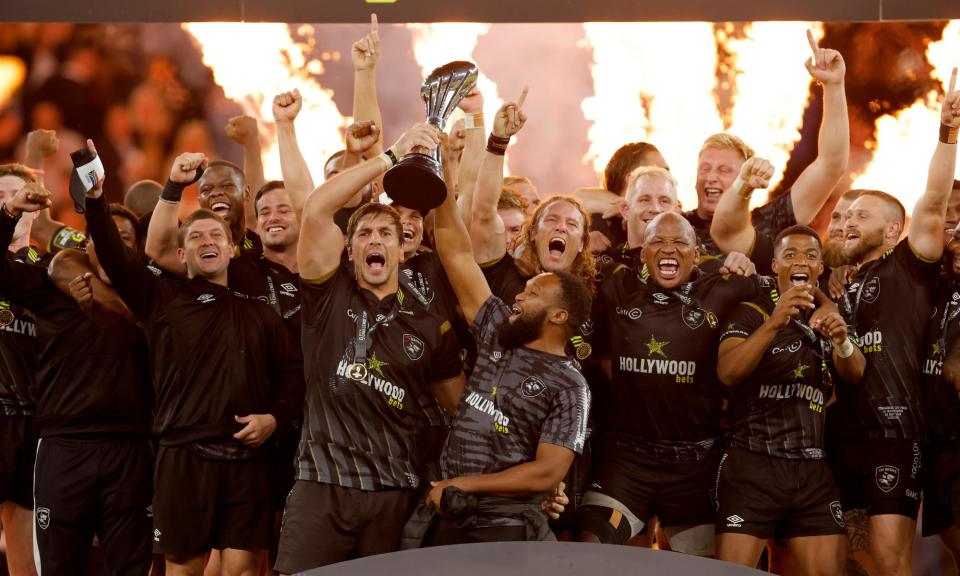Sharks surge to Challenge Cup glory after Fassi and Mapimpi sink Gloucester

South African sides have been involved in European club rugby for only two seasons but their first piece of silverware is already tucked away. If this was not quite on a par with the Springboks winning last year’s World Cup, it was still a little piece of history to reinforce where the balance of oval-ball power currently resides.
Not for the first time, either, it was a contest decisively shaped by a superior South African scrum. The destructive “Bomb Squad” front row who have established such a formidable name for themselves at Test level were key figures again, with tries from Phepsi Buthelezi, Aphelele Fassi and Makazole Mapimpi, and 21 points from the boot of the fly-half Siya Masuku sealing the deal.
Related: Leinster must stem the Toulouse tide to taste Champions Cup glory again
Ultimately it made for another frustrating experience for the Cherry and Whites, who were unable to establish any consistent platform from which their pacy backs might conceivably have caused some problems. At least they were not on the receiving end of a 90-0 hiding this time but there was to be no happy ending to their difficult domestic season on a mild evening at Tottenham’s state-of-the-art stadium.
It was a whole different world from the Shed, Gloucester’s slightly more homespun vantage point at Kingsholm and the Sharks front five, containing four Springbok World Cup winners in Ox Nché, Bongi Mbonambi, Vincent Koch and Eben Etzebeth also remain a definite cut above the average. “That front row have dominated some of the best scrums in world rugby,” acknowledged their director of rugby, George Skivington. “Once they got dominance there, it made it pretty hard. Ultimately they squeezed us as they do very well.”
Gloucester knew they were going to need early points but, despite a frenzied spell of initial pressure could not locate any. A stretching Chris Harris was denied a try when Etzebeth’s knee dislodged the ball inches short of the line and, despite the sin-binning of the full-back Fassi, it was the Sharks who went ahead through a penalty from Masuku.
It needed a monster long-range effort from the flame-haired scrum-half Caolan Englefield to put them back on level terms but the game’s first try went to the Sharks courtesy of an electric burst from their fast-footed No 8 Buthelezi. A conversion and a second penalty from Masuku stretched the margin to 13-3 and left Gloucester with serious work to do.
There was even a 50-22 for the tight-head Koch, who was also having an influential night in his primary role. The first four scrums of the game all resulted in penalties against Gloucester and, despite the occasional stolen ball at the lineout, a 13-point margin at half-time reflected a contest that was fast slipping away.
Gloucester needed a flash of inspiration from somewhere, with Zach Mercer being tightly policed and seldom in a position to roam free in the wider channels. Englefield is a player with a growing reputation while Adam Hastings did his best to make things happen but the Sharks’ set-piece dominance and enthusiastic defence were combining to make life increasingly awkward.
Things were not about to get any better, despite a complete Gloucester front-row reshuffle. First Fassi rounded off a prolonged period of pressure by diving over between the posts before a lovely cross-kick found the lurking Mapimpi wide on the left to put the outcome beyond any doubt.
Gloucester did finally make it on to the score sheet with tries for the replacements Albert Tuisue and Santiago Socino and a charging Freddie Clarke but even the staunchest Gloucester supporter knew there was no realistic prospect of a way back, particularly when Stephen Varney had a potential try ruled out for offside. For all the logistical issues and long-range flights, here was further compelling evidence that South Africa teams are mighty tough to shake off when major knockout games come around.
And, whether their opponents like it or not, South Africa look destined to remain part of the European furniture for “the foreseeable future” according to tournament officials.
Dominic McKay, the EPCR chairman, has also insisted that negotiations were continuing regarding a fresh TV deal for next season’s Champions Cup, dismissing fears that an acceptable offer might not materialise.

